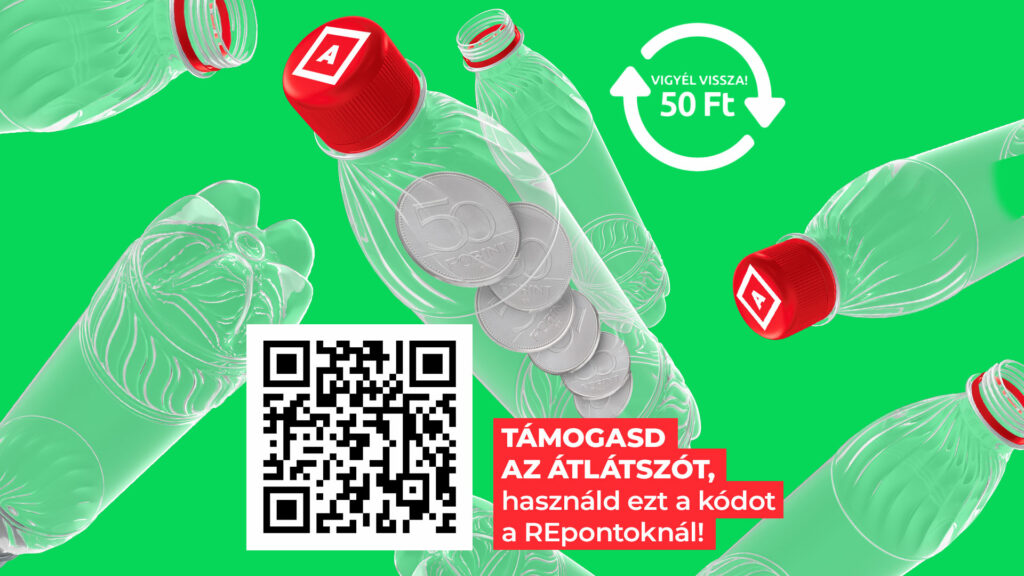The https://english.atlatszo.hu use cookies to track and profile customers such as action tags and pixel tracking on our website to assist our marketing. On our website we use technical, analytical, marketing and preference cookies. These are necessary for our site to work properly and to give us inforamation about how our site is used. See Cookies Policy
Bottle it up – a chance to donate to Atlatszo with no risk of eroding national sovereignty
One of the achievements of this year’s new recycling system is that it allows you to support foundations and civil organizations easily. There’s no need for bank transfers, no need to provide any data, no need to do anything but return PET, aluminium and glass bottles to a REPONT machine, scan a QR code, and deposit the empty beverage containers. It’s good for Earth, good for us, and completely anonymous for you.
If you’d like to support us, save the QR code shown in the image to your phone and scan it when recycling. The HUF 50 deposit will automatically be transferred to the chosen organization – in this case, the Átlátszónet Foundation – by MOHU.

The machine may not accept the code at first, but don’t be deterred – technical difficulties. Try, try again. Once the organization’s name appears on the screen, you can deposit the bottles. MOHU instantly transfers the value of the deposited bottles, so the amount lands in our account within seconds.
Through MOHU, you are supporting us from within Hungary, in Hungarian forints.
There is no foreign intervention involved. There is no dirty money from the seedy lefty liberal underbelly of the United States of Wokeness. There is no threat to national sovereignty and traditional Christian values.
Everyone’s a winner, baby.
A slow but welcome start
The new “return-everything” system launched slowly in Hungary. As of January 1, 2024, almost all products made of plastic, metal, or glass and with a volume of 0.1 to 3 litres are subject to a mandatory deposit fee.
If this brings to mind the hard plastic bottles of the 1990s, think again—under the new system, the PET bottles we’ve grown accustomed to are now part of the scheme, with an additional HUF 50 charge at purchase that you get back when you return the bottle.
The deposit return system—known as DRS (Deposit and Return System)—is not mandatory. However, to reach the EU’s 77% PET return rate by 2025 and the target 90% by 2029, consumers may want some motivation. We aim to do our part in this process.
Manufacturers are required to register and pay service and connection fees for five years, in line with government-set rates, to cover initial investments. In parallel, system operator MOHU must collect deposit fees for single-use packaging. Glass bottles that previously carried deposit fees also play a role, but these now involve significantly higher amounts. For one, syrup bottles currently cost HUF 178.
MOHU has started to install REPONT machines, which are now required in every grocery store over 400 square meters in area.
Just as we were on the edge of our seats for the Olympics, we waited with bated breath to see if the machines would work.
Many stores have seen the arrival of collectors with bags on bags of bottles – a side hustle already popular in cities like New York and Istanbul.
According to MOHU’s data, 3.2 billion bottles are sold annually in Hungary. The environmental impact of the effort is not insignificant.
Once the bottles are deposited into the machines, you have three options for the refund: transfer the amount to your bank account, spend it in-store as a voucher, or donate it to a charity.
If you choose to donate, MOHU supports paediatric care this year.
To probably no one’s surprise this late in the game, the beneficiaries include two state-run children’s hospitals and one run by the Reformed Church. The Heim Pál National Institute of Paediatrics wants to use donations to upgrade outdated digital and medical technology. Bethesda Children’s Hospital plans to use the funds for new equipment and better infrastructure. The Semmelweis University Paediatric Clinic needs new medical equipment for daily care.
MOHU has stated that it would announce the total amount raised by July 15, 2024, and continue publishing the figures every six months. We have yet to find this information on their website.
We reached out to MOHU’s press department to learn how much money has been collected for each institution and what happens to the aluminium and PET bottles that are collected as recyclable material, but we did not receive a response prior to this article’s publication date.
A burdensome return process
The system is finicky.
Bottles cannot and should not be crushed. The machines won’t recognize them. Households that consume a lot of bottled beverages will face the prospect of schlepping large volumes of clanking bottles to the nearest collection point.
Stores are responsible for storing the bottles, but they cannot fix the machines in cases of mishaps. Technicians can take days to arrive to rejig the system.
The HUF 50 deposit fee is more of a disincentive – or a barrier – for those in deep poverty. This forces them to dumpster dive in larger cities instead of engaging in the cyclical economy as initially intended. (If only some of that firework money was spent on them.) Much can be earned from scavenging – the Sziget Festival was a treasure trove.
Hikers and vacationers often don’t have storage space. Those with willpower take their bottles home and discard them in collection points later. Many give up and toss them in the bin.
The ultimate winner – MOHU
MOHU estimates that the 3.6 billion beverage containers generated annually have a value of HUF 180 billion. Even if the EU’s leading countries’ 90% return rate is met, MOHU still takes home HUF 18 billion in profits. At a 70% return rate, they get HUF 54 billion.
According to the company, 3.5 million bottles are currently returned daily – a figure that continues to grow. Multiply this by 365 days – that’s 1.27 billion bottles. That’s still only 33% of the bottles sold. Give or take, 67% of the deposit fees land with MOHU.
There are currently around 3,000 machines in operation, with plans to increase that number to 4,000. For comparison, Slovakia, with a population of 5 million, operates around 3,200 collection points. The deposit fee is 0.15 euros per container.
In Germany, all stores larger than 200 square meters are required to operate machines, and anyone selling returnable products must accept them. People often leave bottles next to public trash cans in support of those in need. An online platform allows for larger collections to be donated. In the German system, different types of waste are worth different amounts, ranging from 8 to 25-euro cents.
MOHU has developed an app called REPONT, which allows users to transfer the refund to their bank accounts, find the nearest return location, and track how many bottles they have returned.
Support for NGOs and civil organizations that work to cure children or help the underprivileged or protect the remnants of a democracy is always good. In this small country in the middle of Europe, many of these organizations don’t have much alternative support.
It is bittersweet that bottle donations worth HUF 50 could make a difference.
Translated by Vanda Mayer. The original, Hungarian version of this story was written by Zsuzsa Zimre and can be found here.
Share:
Your support matters. Your donation helps us to uncover the truth.
- PayPal
- Bank transfer
- Patreon
- Benevity
Support our work with a PayPal donation to the Átlátszónet Foundation! Thank you.
Support our work by bank transfer to the account of the Átlátszónet Foundation. Please add in the comments: “Donation”
Beneficiary: Átlátszónet Alapítvány, bank name and address: Raiffeisen Bank, H-1054 Budapest, Akadémia utca 6.
EUR: IBAN HU36 1201 1265 0142 5189 0040 0002
USD: IBAN HU36 1201 1265 0142 5189 0050 0009
HUF: IBAN HU78 1201 1265 0142 5189 0030 0005
SWIFT: UBRTHUHB
Be a follower on Patreon
Support us on Benevity!


